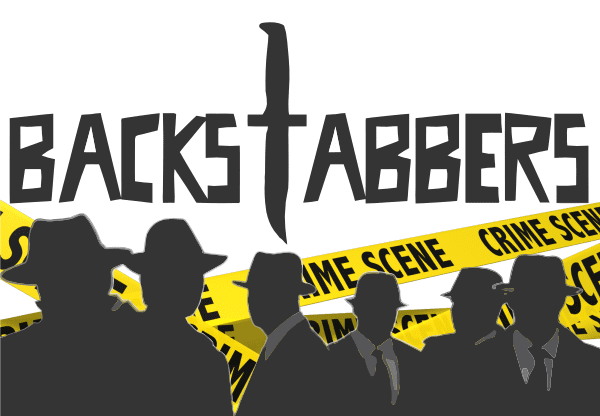What Problem Do We Solve?
Problem: Party games are complicated. They can be focus consuming. They seldom drive socializing.
Answer: Using minimal technology, create a casual party game that is simple, fun, and built on socializing.
Our primary observation about the vast majority of party games was that they were a drain on socializing. Think about shuffling cards, setting up a board game, paper currencies, rolling dice, moving game pieces. All these actions take up time that could be spent socializing. Poker is just a vehicle for many folks to socialize. A great example of this is the person at the poker table who has to be reminded to ante up frequently. Table games fix people at the table and keep them from mixing with the normal flow of conversation. The problem became clear, traditional games require a lot of focus and hinder socializing in some form.
When we looked at why this happens, it was obvious: none of these games were built upon socializing. There are plenty of socially oriented games, but not built upon it. We had to look pretty far back in time to find concepts to draw inspiration from to solve this problem. Before TV and radio were popular, parlor games added fun to regular social gatherings. We extracted good aspects of these games to create a new formula for how to make a party game great using the latest and least amount of technology.

Our Formula For Making A Great Party Game
1. Focus on broad audience
Typical social gatherings are family or friends oriented. A game that appeals to the oldest and youngest alike can be a unifying force. A very appealing game brings people together with simple intrigue and laughter. Having a fun ice breaker for new people can make them feel welcome in moments.
2. Lack of exclusion
Adult themed and drinking games that aren’t afraid to “go there” can be entertaining but not for all age groups. Not gauging comfort levels can backfire. Drinking games have an obvious binge aspect that can create cringe at your gathering. These extreme elements form barriers to inclusion.
3. Simple and memorable
A great party game is one that is simple enough to explain to the person standing next you in a few minutes. Simple structure, rules and logic make introducing the game to new people simple. This also gives new players a foundation for more elaborate modes of play.
4. Unpredictable endings
When game play is unpredictable, it forces players to use their senses and wits to win. Having unpredictable endings can make a game much more memorable.
5. Varied modes of play
Learning more complex ways to play comes through quick understanding of simple rules. Having increasing difficulty creates modes of play people are familiar with from other games.
Our Solution – “Thin-Tech”
Incorporating the five outlined points into a game built around socializing created an obvious choice, Murder Mystery. The popularity of the genre withstands the test of time. The typical problems with Murder Mystery games are the quality and availability of detailed stories. Supplying endless roles and narratives distracting when compared to playing one of two simple roles.
Our solution does away with the unnecessary narratives and burdens on players. We’ve found a way to use a minimal amount of technology to keep you actively playing our murder mystery. We have designed an array of game dynamics that open up the game for difficulty and variety.
Our “Thin-Tech” approach keeps the mundane details such as player status, updates, randomizing roles, keeping score, all conveniently stored in a single interface for fast reference and group coordination. Players are free to focus on the normal flow of engaging with others. Our mission is creating quality time and memories for you with your friends and family. You can add extra fun to any regular social gathering using our solution.

Deep Dive Bonus Benefits
Psychological
We take typically negative emotions like suspicion, subversiveness, and guile to exercise them in a positive and fun playful way. We harness the power of bluffing and sleuthing skills needed to win. Someone is not who they say they are. Figuring that out with observation and deduction adds mystique to your event, while providing a unique group experience. Keep your guests and friends engaged.
Modernization
Anyone hosting a gathering wants to be sensitive to their guests needs. We’ve addressed modern needs by using more than winking as an elimination gesture. Winking can be uncomfortable and inappropriate with different guests and venues. The person hosting the game can easily judge this knowing their guests and by speaking with them. This is lack of exclusion in action. Everyone can feel comfortable when playing. If you want to play in the office, you can do so without raising any eyebrows in Human Resources.
Networking
Using this lack of exclusion works great for gatherings where people are getting to know new people. They can be comfortable and the game is a terrific icebreaker. Trying to remember new names and connecting them to faces is easier via our app. We help you build new friendships faster.
Economic
Our solution is free to play for up to six players. By free we mean we subsidize it with the smallest amount of advertising we possibly can. A family of five, a small group of college friends or a senior bridge club can afford to play the basic game. We offer the game for larger groups and with more advanced game dynamics as in app purchases. We don’t need to sell your email address or cell phone number to advertisers. This is our business model.
Thank you for taking a deeper interest in Backstabbers.
Read more about our company, Parlor Interactive, or contact us here.
Top of page here. Return to Home.